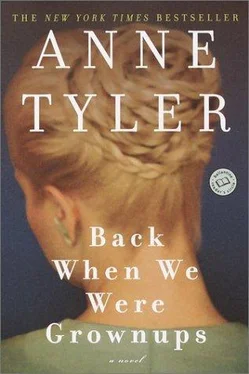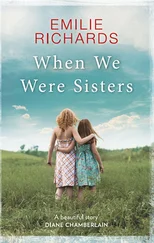“That’s amazing,” Will said.
And as he lifted his spoon he opened his mouth to expose his large, square, wolfish teeth, unattractively yellowed now with age.
* * *
By the time they’d finished their ice cream, Rebecca had revised all her expectations of the evening. This was just another family melee with an extra person added, and she heartily wished it were over. She was tired of acting nicer than her true self. Wouldn’t it come as a relief to be alone, finally! To be upstairs in the family room, playing a game of solitaire! She longed to kick her shoes off, and let her stomach stick out, and allow her face to go slack.
None of the others, though, seemed in any hurry to go. Zeb was telling Will about his work; Poppy was repeating the ice-cream incident to Peter; NoNo was asking Rebecca what kind of plant that was in the foyer. “It’s not an anthurium, although it’s certainly grotesque enough; too big to be a pilea, in spite of those warty leaves…”
“Ask Will. He’s the one who brought it.”
“… surely can’t be a dracaena, though it does have that mottled, diseased look of the Dracaena godseffiana …”
When NoNo and Peter finally rose to leave, Rebecca stood up too and said, “Yes, it is late, isn’t it. I can hardly keep my eyes open.”
Even Will couldn’t miss that. He untangled himself from his chair and said, “Ah. All right. So, I guess…”
Everybody waited, but he just stood there. It was Zeb who completed his sentence for him. “I guess we should all be going,” he said helpfully.
Then they headed in a group toward the door, leaving Poppy alone at the table scraping out the ice-cream carton.
Outside, Rebecca folded her arms across her bosom and watched as Zeb climbed into his car (a Volvo so old it had the humpbacked shape of the earliest models) and NoNo and Peter walked on down the street to NoNo’s minivan. “Good night,” NoNo called back, her voice floating across the twilight, and “Good night,” Zeb called.
But Will stayed next to Rebecca, and so she was forced to say, finally, “Well, I should be going in now.”
“You used to have this long cloak,” he told her. “Do you remember that?”
“Cloak,” she repeated.
“It was a color called champagne. Your mom and your aunt sewed it for you the year we started college. I can see you in that cloak to this day. It matched your hair exactly. You wore your hair coiled in a braid on top of your head. You wore that cloak and these soft brown boots that crumpled around your ankles. You looked like somebody out of King Arthur’s time, I often thought; or Robin Hood’s. Very self-possessed and calm.”
Rebecca still faced the street, but she was listening.
“I guess this sounds presumptuous,” he said, “but I can’t help feeling that that woman in the cloak is who you really are, and I’m the only person who knows it. I feel that I can see you, in a way other people can’t. I don’t mean to sound presumptuous.”
She turned to look at him. With the streetlight shining behind him, she couldn’t tell what his expression was. She had to rely more on feeling than on sight — feeling the steady focus of his regard, and then his dear, familiar warmth as he stepped forward to hug her. They clung together for maybe a minute, like people consoling each other for some loss. Then he pulled away and said, “I’ll call you! I’ll call tomorrow! Thanks for supper!”
He plunged off down the street, clanging against a garbage can as he hurtled around the corner and disappeared.
Rebecca stood there for some time after he had gone. She was shivering slightly, even on this hot summer night, and she felt happy but also dismayed, and bashful, and confused.
At that moment, it seemed she actually had managed to become her girlhood self again.
You wouldn’t call it a courtship. What would you call it? Just say they, oh, started arranging to get together now and then. Go shopping for a book Will had heard of. Grill steaks in Rebecca’s backyard. (But with Poppy there too, of course, wanting a steak of his own, and Biddy happening by later as they were sitting around the table.) These certainly weren’t anyone’s notion of romantic assignations.
Still, Rebecca let herself think sometimes: might it be possible, after all, to return to that place where her life had forked and choose the other branch now? Even this late in the journey? Even after she had used up the branch she had first chosen?
It seemed like cheating. Like having her cake and eating it too.
She remembered things he did not; he remembered things she did not. Their past was a bolt of fabric they had scissored up and divided between them. He had no recollection, for instance, of the World’s Fastest Typist. “Why would they have wasted our time with a typist, for heaven’s sake?” he asked, and she told him, triumphantly, “That’s exactly what you said when you were seventeen!”
He remembered that she used to recite poetry on their dates, although she couldn’t believe she would ever have been so mawkish. That she’d kept a scrapbook of thought-provoking quotations from her reading; that she’d worshiped Joan Baez’s singing; that she’d very nearly committed to heart The Feminine Mystique. All of which sounded to her like some completely unrelated person— she, rather than I .
And did he recall, she wondered, a night when they’d been studying late at his house, and his mother had gone to bed, and they had decided to take a catnap on the sofa? It was the first time they had lain down together. The length of his body pressed against hers had felt so good and so needed; his quick, hot breaths had sent a sort of ruffle up her spine. Now she couldn’t say who had finally brought things to a halt. Both of them, perhaps.
But this was not one of the memories she mentioned to Will. No, they weren’t yet familiar enough for that. At the moment they were still very restrained with each other, very circumspect and proper. When they met, he would kiss her lightly on the lips (his mouth not one she recognized), and when they sat in her family room, he would let one arm rest along the back of the couch behind her. Both of them were well aware that somebody might walk in on them at any moment. Comfortably aware, Rebecca might have said. Secure in the knowledge. Poppy would call, “Beck?” or the telephone would ring, or the front door would slam open, and the two of them would separate slightly, looking elsewhere, clearing their throats. At the end of a visit they hugged goodbye. Rebecca looked forward to those hugs. It seemed that her skin felt thirsty for them.
Her family — the few family members who’d met him — appeared to believe that Will was just another of her strays, like that electrician whose marriage had been breaking up the whole time he was wiring the house for air-conditioning. “Oh, hi,” they would say offhandedly, and then they would rattle on about whatever had brought them here. Rebecca found this slightly insulting. Did they feel she wasn’t capable of romance? All they seemed to notice was that she had grown less available to them. The Friday after she went with Will to a lecture at Johns Hopkins: “Where were you?” they demanded. “We came to dinner last night and Poppy was all by himself. It was Thursday! You weren’t here!”
“There’s no law that says I have to stay home every Thursday of my life,” she told them. Although, as a matter of fact, she had simply forgotten what day of the week it was. Oh, she was very absentminded lately, very muzzy and distracted. She lost her place in conversations, failed to answer when people asked her questions. Everybody who wasn’t Will struck her as irrelevant. “Really,” she would murmur, and, “Isn’t that interesting,” but inwardly she was saying, Get on with it! and, What difference does it make?
Читать дальше












